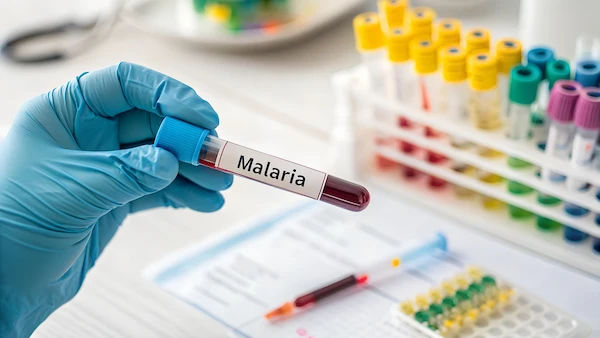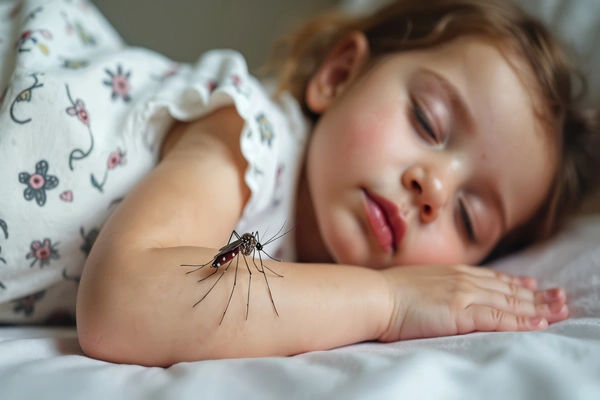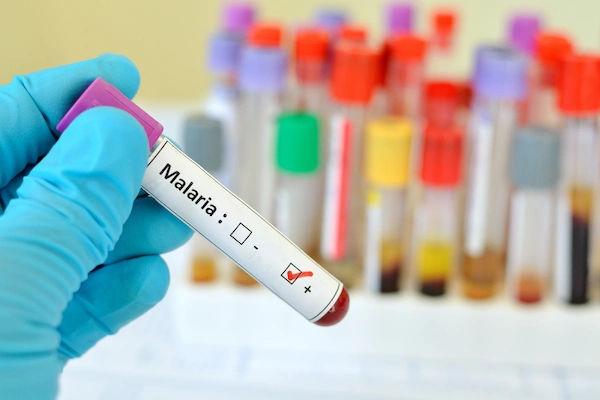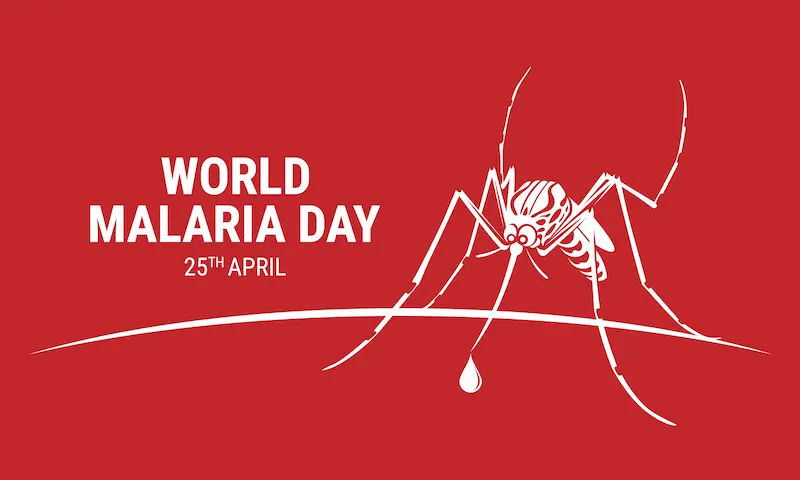Malaria Causes and Treatment
Discover the causes, symptoms, and effective treatments for malaria. Learn how this mosquito-borne disease spreads, prevention methods, and the best treatment options available

Written by Dr.Sonia Bhatt
Last updated on 13th Jan, 2026

Malaria is a significant global health issue, particularly prevalent in tropical regions where the Anopheles mosquito thrives. This disease is caused by Plasmodium parasites, with symptoms such as fever, chills, headache, and flu-like discomfort. If not treated promptly, malaria can lead to serious complications like anaemia, respiratory distress, and potentially death, particularly in vulnerable populations such as young children and pregnant women.
Preventive measures are vital in endemic areas and include using insecticide-treated bed nets, indoor spraying, and taking antimalarial medications for travellers. Community awareness and education about malaria transmission and prevention are also crucial in reducing infection rates. Timely diagnosis and treatment are essential for effectively managing malaria. If you or someone you know develops symptoms after visiting a malaria-endemic area, it is important to seek medical help without delay to ensure the best possible outcome.
Causes of Malaria
Malaria is caused by Plasmodium parasites, with five species capable of infecting humans. The infection cycle begins when a female Anopheles mosquito bites an infected person, acquiring the parasites. When this mosquito subsequently bites another individual, it transmits the parasites into their bloodstream, where they multiply.
In rare cases, malaria can be transmitted from a pregnant woman to her fetus during pregnancy or childbirth. While transmission through blood transfusions, organ donations, or shared needles is possible, it is uncommon.
Once the parasites enter the bloodstream, they migrate to the liver, where they multiply. The liver releases new parasites back into the bloodstream, leading to infections of red blood cells. Some parasites can remain dormant in the liver, potentially causing future recurrences.
Pathophysiology of Malaria
Malaria is caused by several species of Plasmodium, with four main ones affecting humans. A fifth species, Plasmodium knowlesi, primarily infects monkeys but can occasionally infect humans. The majority of cases are due to P. falciparum and P. vivax.
Stages of infection includes:
1. Infection
Infection begins when a female Anopheles mosquito bites a human, injecting up to 100 sporozoites. These sporozoites enter the bloodstream and travel to the liver, where they invade liver cells (hepatocytes).
2. Liver Stage
In the liver, sporozoites mature into schizonts over 5 to 21 days, releasing 2,000 to 40,000 merozoites into the bloodstream.
3. Blood Stage
Merozoites infect red blood cells, feeding on haemoglobin. They first appear as ring forms, then develop into trophozoites, producing hemozoin as a waste product. Trophozoites can mature into schizonts, releasing more merozoites, or into gametocytes, which can be taken up by another mosquito.
4. Mosquito Stage
Inside the mosquito, gametocytes undergo sexual reproduction, forming ookinetes that invade the midgut wall and develop into oocysts. These oocysts release sporozoites that migrate to the salivary glands, ready to infect a new host.
Risk Factors for Malaria
The likelihood of contracting malaria is higher for those living in or travelling to regions where the disease is prevalent, such as parts of Africa. The risk of severe illness or death increases if you:
Have a weakened immune system
Young children and infants
Older adults
Travellers from malaria-free regions
Pregnant women and their unborn children
In many high-malaria countries, limited aMalaria Causes and Treatmentccess to preventive measures and healthcare exacerbates the situation. Residents of malaria-endemic areas may develop partial immunity through repeated exposure, which can reduce symptom severity. However, this immunity may diminish if they relocate to areas with less exposure to the parasite.
Symptoms of Malaria
Symptoms generally emerge one week to a month after infection, although some individuals might not show signs for an extended period. In certain cases, the infection may improve with treatment but can recur years later. Malaria can cause a range of signs and symptoms that vary in severity. Common manifestations include:
Fever and sweating
Intense chills
Headache and muscle pain
Fatigue
Chest discomfort
Breathing difficulties
Cough
Diarrhoea
Nausea and vomiting
Seizures
As the disease advances, complications such as anaemia and jaundice (yellowing of the skin and eyes) may develop.
Severe symptoms
Some forms of malaria can lead to severe health issues, particularly in high-risk individuals. Severe symptoms can include:
Extreme exhaustion
Confusion or altered consciousness
Multiple seizures
Dark or bloody urine
Unusual bleeding
Consult Top General Physician
Diagnosis of Malaria
Early diagnosis is crucial for effective treatment, as symptoms can emerge up to a year after infection, even if antimalarial drugs have been taken.
Individuals experiencing symptoms suggestive of malaria should seek medical advice, especially if they have been in a malaria-endemic area within the last 12 months. A healthcare provider will assess symptoms and travel history and may order a complete blood count to evaluate for anaemia. The most accurate method for diagnosing malaria is through direct observation of the parasite in thick and thin blood smears by a skilled microbiologist.
Rapid diagnostic tests (RDTs) can identify malarial antigens in the blood and can provide results in 2 to 15 minutes but may have lower sensitivity and might not distinguish between species due to regional differences. Polymerase chain reaction (PCR) testing is also available for precise species identification at specialised laboratories.
Treatment of Malaria
The treatment for malaria varies based on factors such as disease severity, available medical resources, geographical location, local Plasmodium species prevalence, patient genetics, previous malaria prophylaxis, awareness of local drug resistance, and pregnancy status.
For Plasmodium falciparum infections, the primary treatment is artemisinin combination therapy. Severe cases require intravenous treatment followed by an oral regimen.
Patients with P. vivax or P. ovale infections need additional anti-relapse therapy with an 8-aminoquinolone, such as primaquine or tafenoquine, due to the formation of hypnozoites in the liver, which are not affected by standard treatments.
Most individuals recover completely with timely care. Treatment typically includes medications to eliminate the parasite, supportive care, and hospitalisation for severe symptoms. Intensive care may be necessary in critical cases.
Common antimalarial medications include:
Chloroquine
Hydroxychloroquine
Primaquine
Artemisinin-based therapies
Atovaquone-proguanil
Treatment usually lasts about two days, but specifics can vary based on several factors and those with complications may require a combination of treatments.
Complications Associated with Malaria
Serious complications include:
Cerebral Malaria: Blockage of small blood vessels in the brain, leading to swelling, seizures, or coma.
Respiratory Issues: Pulmonary oedema causes severe breathing difficulties.
Organ Failure: Damage to vital organs like the kidneys and liver, or spleen rupture, can be life-threatening.
Anaemia: A reduction in red blood cells impairs oxygen delivery to tissues.
Hypoglycaemia: Low blood sugar levels can occur, potentially leading to coma or death.
Recurrence: Certain strains of the malaria parasite can remain dormant, causing milder infections that may relapse over time.
Prevention and Control Measures
Effective strategies for preventing malaria include:
Awareness: Understand the risks in specific regions.
Mosquito Bite Prevention: Use insect repellent and wear long sleeves and trousers.
Antimalarial Medication: Take antimalarial tablets when travelling to areas where malaria is prevalent.
Prompt Diagnosis and Treatment: Seek medical attention if you suspect malaria.
Vaccination: Administer the malaria vaccine to children in endemic regions.
Antimalarial drugs can be about 90% effective, but it’s crucial to combine them with measures to prevent bites. Travellers should consult healthcare providers well in advance regarding antimalarial medications, as these often need to be started days before departure.
To reduce the risk of mosquito bites, particularly during peak activity hours (dusk to dawn):
Cover Up: Wear long trousers and shirts, and tuck them in.
Use Insect Repellent: Apply EPA-approved repellents on exposed skin.
Treat Clothing: Use sprays containing permethrin on clothing.
Sleep under Nets: Insecticide-treated bed nets offer protection during sleep.
Conclusion
Malaria is a serious and potentially life-threatening illness that requires timely treatment, with most individuals making a full recovery when care is provided. However, without treatment, complications like cerebral malaria and severe anaemia can arise. Symptoms such as fever and chills can persist for 2 to 24 weeks and may recur later. Those planning to visit regions where malaria is common should seek guidance on preventive measures and antimalarial medications. If symptoms appear within a year of travel, it is important to consult a healthcare professional for testing and possible treatment.
Consult Top General Physician
Consult Top General Physician

Dr. Srujana Mulakalapalli
General Physician/ Internal Medicine Specialist
5 Years • MBBS, MD (GENERAL MEDICINE)
Bengaluru
Apollo Medical Center, Marathahalli, Bengaluru
(25+ Patients)

Dr Syed Mateen Pasha
General Physician
2 Years • MBBS
Bengaluru
PRESTIGE SHANTHINIKETAN - SOCIETY CLINIC, Bengaluru

Dr. Vivek D
General Physician
4 Years • MBBS
Bengaluru
PRESTIGE SHANTHINIKETAN - SOCIETY CLINIC, Bengaluru

Dr. Harshendra Jaiswal
General Physician/ Internal Medicine Specialist
12 Years • MBBS , MD (General medicine)
Kolkata
108 DHANA DHANVANTARI Clinic, Kolkata
(25+ Patients)

Dr. Syed Ismail Ali
General Practitioner
7 Years • MBBS
Hyderabad
Apollo 24|7 Clinic, Hyderabad
Consult Top General Physician

Dr. Srujana Mulakalapalli
General Physician/ Internal Medicine Specialist
5 Years • MBBS, MD (GENERAL MEDICINE)
Bengaluru
Apollo Medical Center, Marathahalli, Bengaluru
(25+ Patients)

Dr Syed Mateen Pasha
General Physician
2 Years • MBBS
Bengaluru
PRESTIGE SHANTHINIKETAN - SOCIETY CLINIC, Bengaluru

Dr. Vivek D
General Physician
4 Years • MBBS
Bengaluru
PRESTIGE SHANTHINIKETAN - SOCIETY CLINIC, Bengaluru

Dr. Harshendra Jaiswal
General Physician/ Internal Medicine Specialist
12 Years • MBBS , MD (General medicine)
Kolkata
108 DHANA DHANVANTARI Clinic, Kolkata
(25+ Patients)

Dr. Syed Ismail Ali
General Practitioner
7 Years • MBBS
Hyderabad
Apollo 24|7 Clinic, Hyderabad




